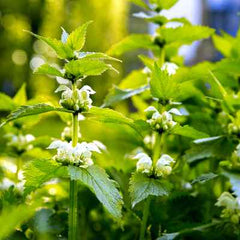Nettle Leaf
A Mineral-Rich Herb for Scalp Balance and Stronger Hair
Nettle, Urtica dioica, is a tall, green, herbaceous flowering plant found throughout much of the world. Known for its serrated leaves covered in fine, hollow hairs, nettle delivers a memorable sting when touched. These tiny hairs inject compounds such as histamine and formic acid, causing temporary stinging, itching, and redness. While unpleasant (and memorable!), this reaction is harmless and fades with time.
Despite its prickly nature, nettle has long been valued as a deeply nourishing medicinal plant, especially in hair and scalp care. Once dried and properly prepared, nettle loses its sting and becomes a rich source of vitamins, minerals, and plant compounds that support healthier skin and hair.
Skin Care Benefits of Nettle
Nettle’s benefits come largely from its exceptionally high mineral and nutrient content, along with its natural anti-inflammatory and antimicrobial properties.
- Fights Acne: Antibacterial properties help combat acne-causing bacteria and keep pores clearer.
- Soothes Inflammation & Itching: Helps calm redness, irritation, eczema, rosacea, and general skin discomfort.
- Balances Oily Skin: Natural astringent qualities help regulate excess sebum while refining the appearance of pores.
- Nourishes & Hydrates: Rich in vitamins and minerals that support skin hydration, elasticity, and resilience.
Nettle tea infusions are traditionally used in facial steams, where warm moisture helps open pores while nettle’s cleansing and soothing properties support clearer-looking skin.
Hair & Scalp Benefits of Nettle
Nettle is especially prized in hair care, where it supports scalp health, strengthens hair, and improves overall appearance and manageability.
- Soothes Scalp Irritation & Fights Dandruff: Anti-inflammatory and antimicrobial properties help calm itchy, irritated scalps and reduce dandruff and flaking.
- Strengthens Hair & Reduces Breakage: Rich in sulfur (a key component of keratin) and silica, nettle helps fortify the hair shaft, improving strength and resilience while reducing split ends and hair shaft breakage.
- Regulates Sebum (Oil) Production: Acts as a natural astringent, helping balance oil production without stripping the scalp, making it helpful for oily hair and scalp imbalance.
- Supports Fuller, Healthier Hair: By improving scalp circulation and nourishing follicles, nettle helps support thicker-looking, healthier hair and may help reduce excess shedding.
- Boosts Shine & Texture: Its mineral-rich profile helps smooth the hair cuticle, resulting in hair that appears shinier, softer, and less frizzy.
Nettle has a long-standing reputation as a tonic for hair loss, dandruff, oily hair, and irritated scalp conditions, making it a foundational botanical in natural hair care.
How We Use Nettle
We use the same dried nettle leaf, prepared in different ways depending on how we want its beneficial compounds to work in a particular product. Each preparation allows nettle’s mineral-rich, scalp-supporting compounds to be delivered effectively for strengthening hair, balancing oil production, and calming dandruff-prone or irritated scalps.
- Slow warm oil infusions are used in natural shampoo bars to help strengthen hair, improve shine, and support scalp comfort
- Loose dried nettle leaf in herbal hair tea rinses to soothe the scalp and support circulation as vitamins and minerals are infused into the tea
- Infused in vinegar for our Apple Cider Vinegar Hair Rinses to help clarify buildup and balance scalp oils
Nettle may sting in the wild, but once properly prepared, it becomes a deeply supportive botanical for stronger hair, calmer scalps, and improved shine and manageability—which is why it plays such a central role in natural hair care.








